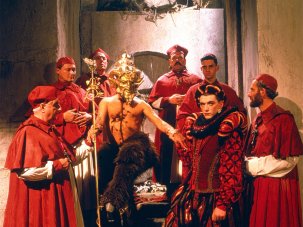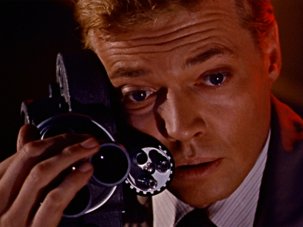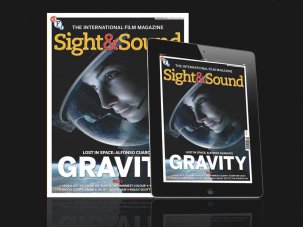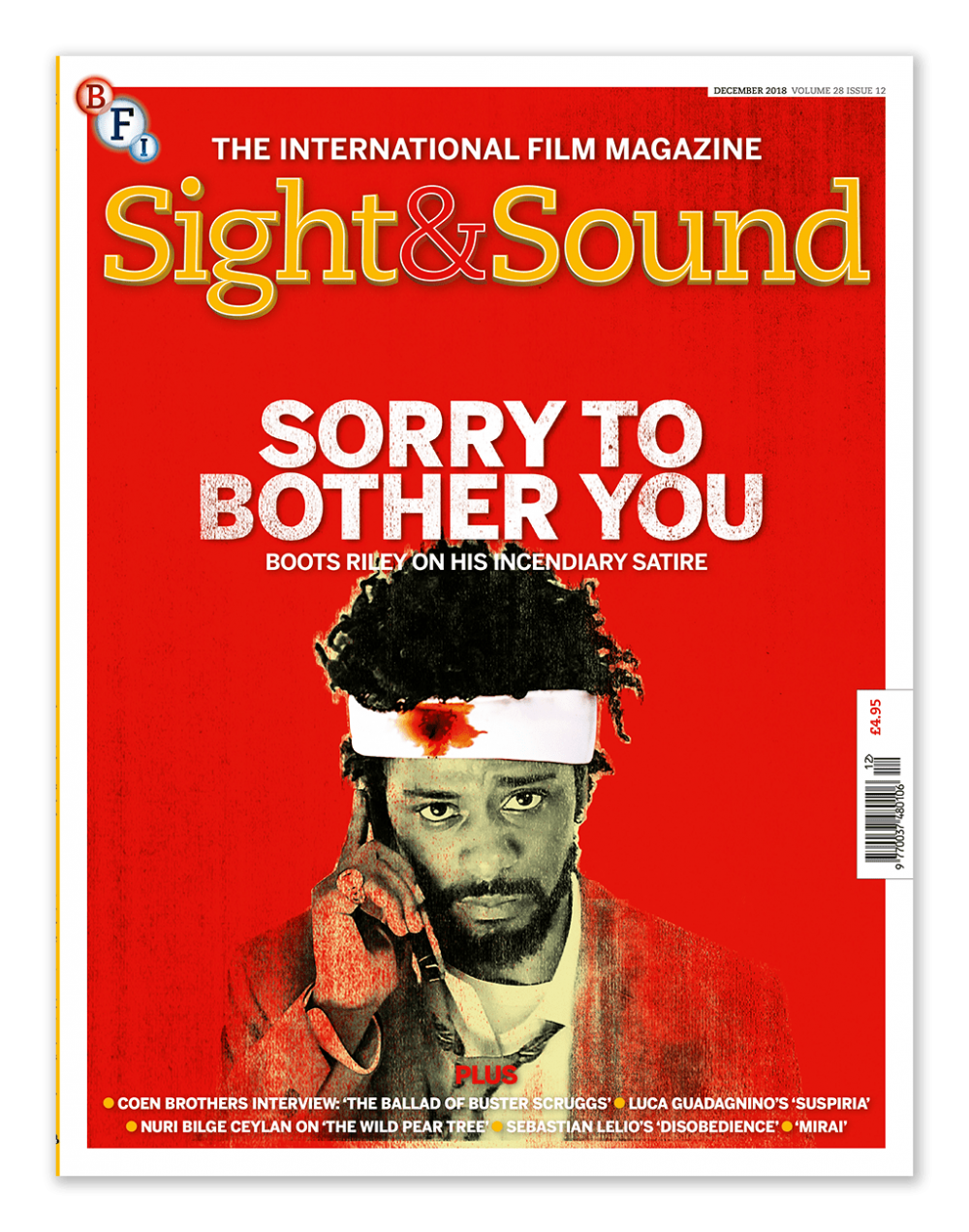
With a straightened tie and a white collar, our December issue is off to work, as we take a look at the most wildly inventive, urgently vital debut feature of the year, Boots Riley’s fabulous absurdist comedy Sorry to Bother You. Kaleem Aftab sits down with Riley for a long, lively and highly entertaining interview to discuss the film, in which Lakeith Stanfield stars as Cassius ‘Cash’ Green, a laidback underachiever living in a garage who suddenly gains rapid promotion at a telemarketing firm after he discovers he can dramatically increase his sales by affecting a ‘white voice’ on the telephone.
Posted to subscribers and available digitally 5 November
→ Buy a print edition
→ Access the digital edition
→
On UK newsstands 8 November
The film’s wildly inventive satirical gaze takes aim at so much more than the indignities of labour in the gig economy world – whether it’s race, gender politics, the gross distortions of late capitalism or the role of protest and resistance, Sorry to Bother You skewers them all. But as Riley tells Aftab, behind the laughs lie a deadly serious intent, as Riley wants the film to work as a piece of agitprop to shake and wake us up to the absurdities that mark so much of modern living. “What I’m making is art that encourages radicals to help create a mass militant radical movement that uses the withholding of labour as a tactic for social change,” he says. “I want the experience to be visceral, so that the audience goes through what Cassius goes through.”
Sorry to Bother You is the latest in a long tradition of Hollywood films to have been set in the office, and pointed satirical jabs at the world of work. One stand out example is the 1980 comedy 9 to 5, starring Jane Fonda, Lily Tomlin and Dolly Parton, and which is re-released to UK cinemas this month as part of the BFI’s major Comedy Genius season. Hannah McGill revisits the film, and considers it alongside other workplace satires, particularly those in the cycle of female-centred films that followed it in the 1980s such as Working Girl and Baby Boom.
Two filmmakers who are no strangers to the absurdist satire are Joel and Ethan Coen, whose latest film, The Ballad of Buster Scruggs, is an anthology of six violent “tales of the American frontier”, which brings their unmistakably Coen-esque sensibilities to bear on the wild west. The brothers talk to Ben Walters about the links between character, story and setting in the western, the pros and cons of digital filmmaking and why there are no Serbians in the film. “Westerns have kind of been in eclipse, with a couple of big exceptions,” Ethan explains. “Since we’re unfashionable, of course we raced towards them”.
Japanese animator Hosoda Mamoru has steadily built a reputation as one of the most interesting anime directors at work today, something his latest feature Mirai confirms. The film mixes delicate realism and psychological acuity with fantasy leaps through a family history to tell the tale of a jealous four-year-old boy whose stable home life is suddenly turned upside down by the arrival of a new baby sister. “There are no other movies like this, about the point of view of a four-year-old boy with a newborn,” Hosoda tells Nick Bradshaw. “It’s a basic human condition, and I wanted to make a movie about the bare soul.”
Negotiating the pressures of family life, albeit of a more adult dimension, are also at the heart of Chilean-Argentinean director Sebastián Lelio’s new film Disobedience, which stars Rachel Weisz and Rachel McAdams as two women who are reunited years after scandalising their North London Orthodox Jewish community as teenage lovers, when Weisz’s character returns from living overseas. The director talks to Nick James about quietude in his films, working as an outsider in London, and what debt his film owes to mythological storytelling.
Another story about a character returning to the places and people of their youth is Turkish director Nuri Bilge Ceylan’s The Wild Pear Tree, the tale of a young man with uncertain prospects reluctantly returning to the rural town where he grew up. “In Hollywood films we’re expected to like or dislike a character immediately,” Ceylan tells Geoff Andrew, “but I’m trying to make films where the contradictions in characters prevent easy judgements”.
Elsewhere in the issue our reviews section covers all the month’s releases, including extended reviews of Kore-eda Hirokazu’s Palme d’Or winning latest film, Shoplifters, and Luca Guadagnino’s updating of Dario Argento’s horror classic Suspiria. Our Books pages include a review of a new book that peels back the covers of Howard Hughes’s Hollywood. And our Home Cinema pages include reviews of Night of the Demon, the essential British documentary filmmaker Marc Isaacs, and a revival of the weird and wonderful work of Brazilian Cinema Novo filmmaker Joaquim Pedro de Andrade.
All that, plus an interview with Paul Dano and Zoe Kazan about their film Wildlife, an overdue celebration of the life and work of Lorenza Mazzetti, and much more besides.
Features
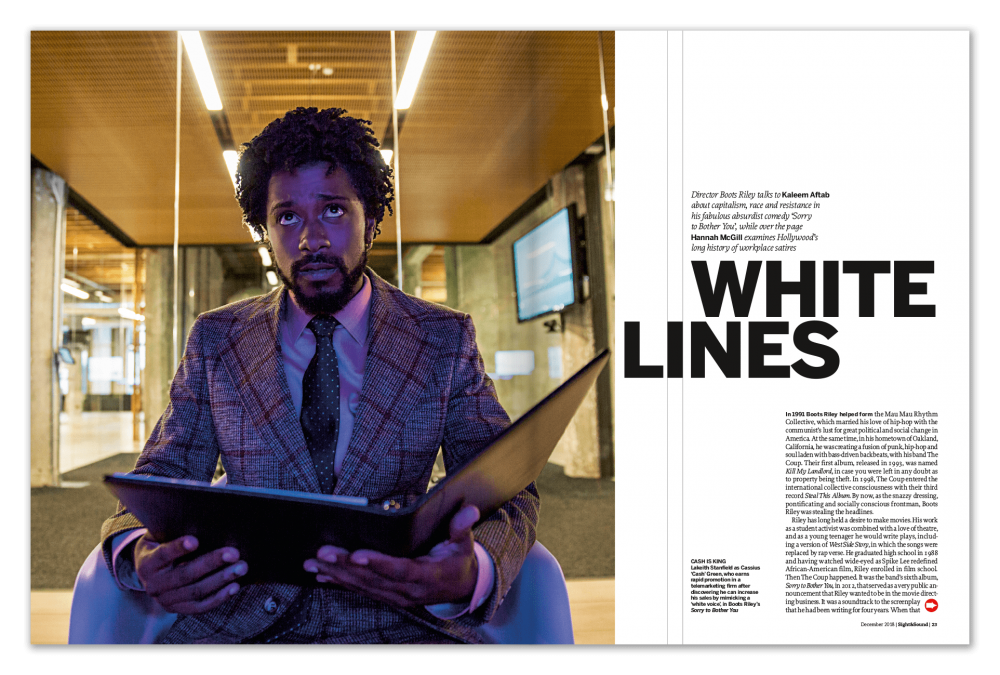
White Lines
Director Boots Riley talks to Kaleem Aftab about capitalism, race and resistance in his fabulous absurdist comedy Sorry to Bother You, while over the page Hannah McGill examines Hollywood’s long history of workplace satires.
+ Getting down to business
The rerelease of the office comedy 9 to 5 offers a timely opportunity to consider Hollywood’s ambiguous relationship with the world of work, explored in satirical films that pose the central question: should we accept the system, leave the system or change the system? By Hannah McGill.
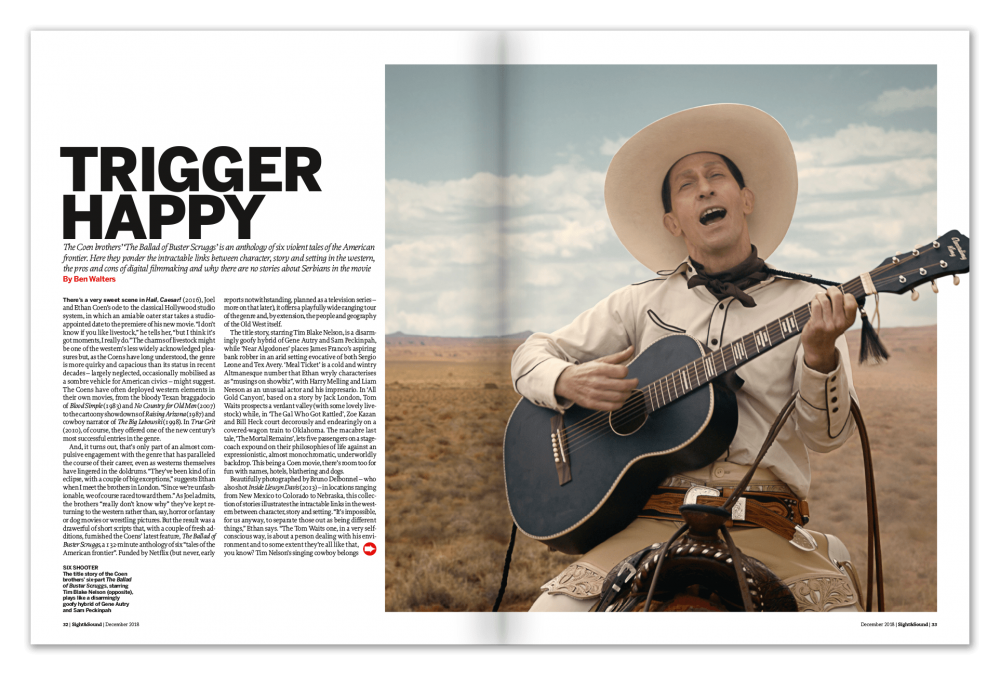
Trigger Happy
The Coen brothers’ The Ballad of Buster Scruggs is an anthology of six violent tales of the American frontier. Here they ponder the intractable links between character, story and setting in the western, the pros and cons of digital filmmaking and why there are no stories about Serbians in the movie. By Ben Walters.
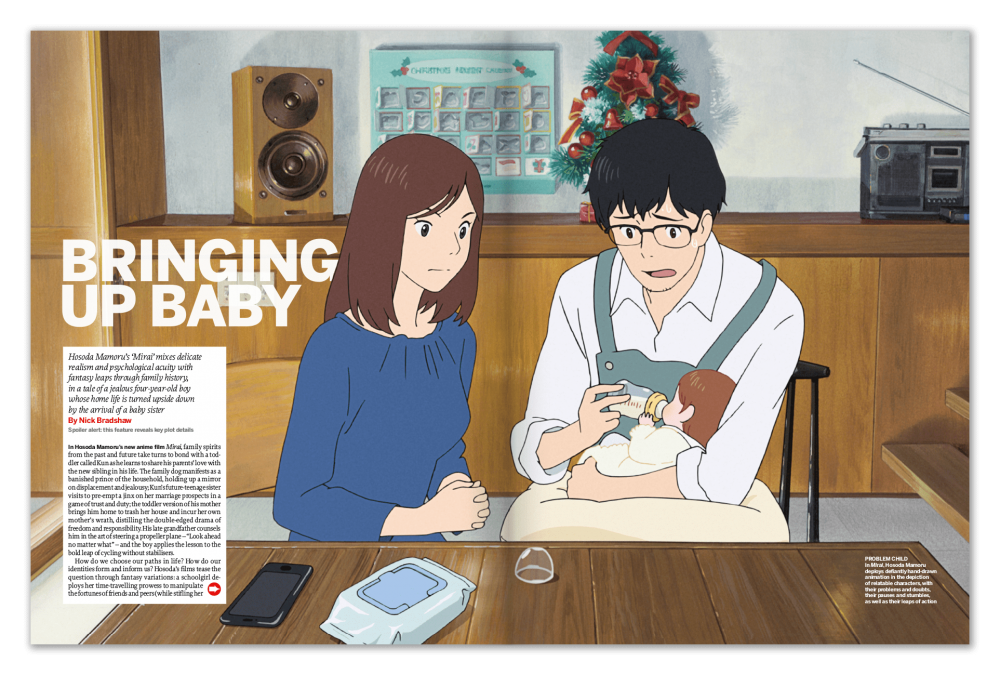
Bringing Up Baby
Hosoda Mamoru’s Mirai mixes delicate realism and psychological acuity with fantasy leaps through family history, in a tale of a jealous four-year-old boy whose home life is turned upside down by the arrival of a baby sister. By Nick Bradshaw.
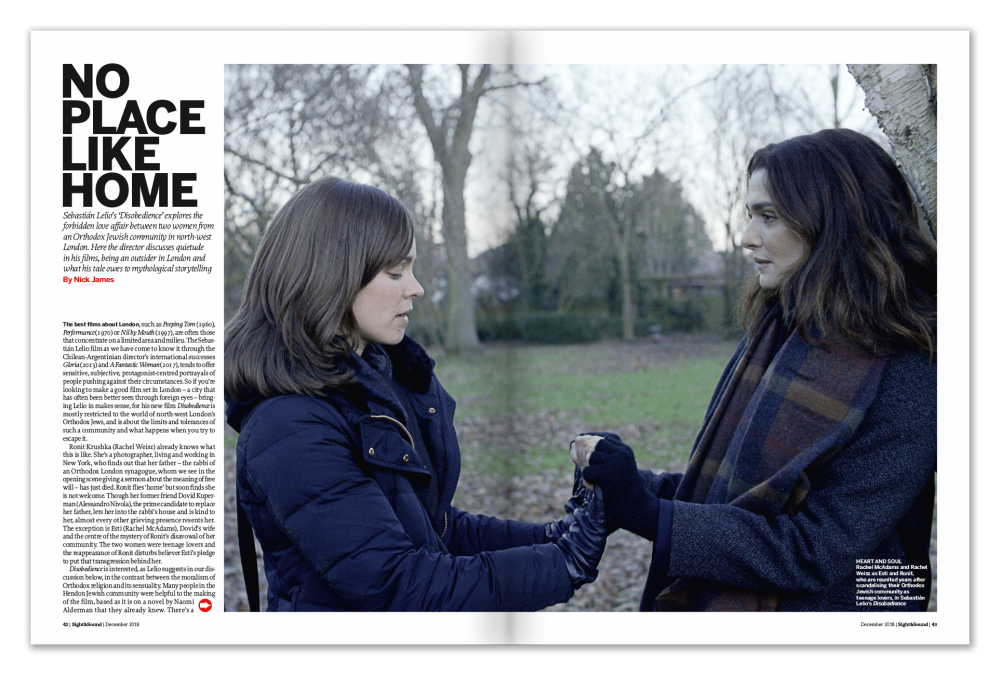
No Place Like Home
Sebastián Lelio’s Disobedience explores the forbidden love affair between two women from an Orthodox Jewish community in north-west London. Here the director discusses quietude in his films, being an outsider in London and what his tale owes to mythological storytelling. By Nick James.
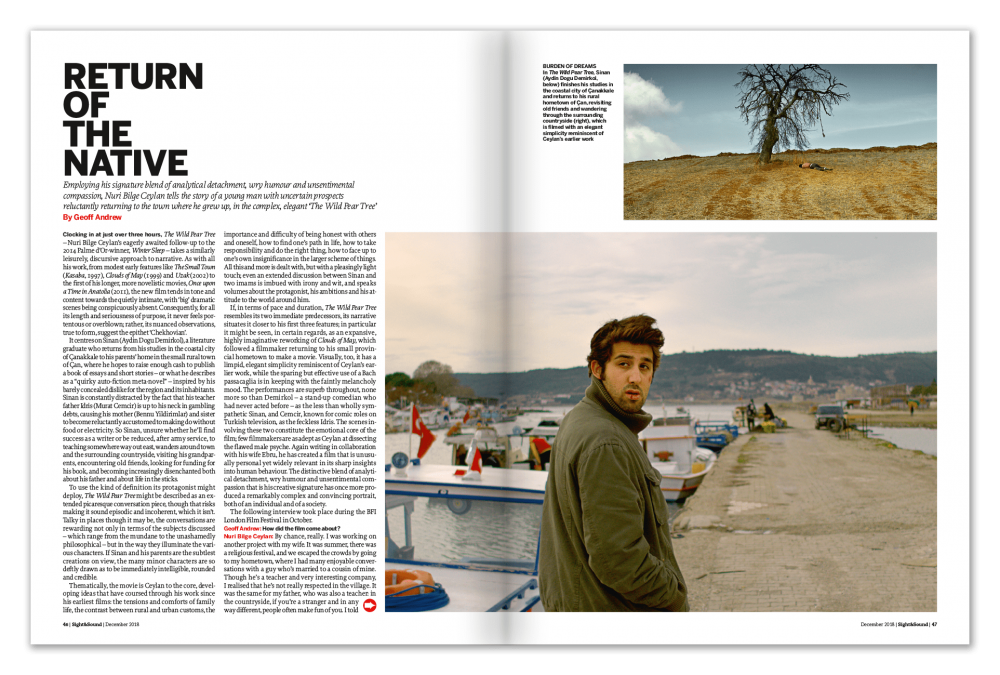
Return of the Native
Employing his signature blend of analytical detachment, wry humour and unsentimental compassion, Nuri Bilge Ceylan tells the story of a young man with uncertain prospects reluctantly returning to the town where he grew up, in the complex, elegant The Wild Pear Tree. By Geoff Andrew.
Regulars
Editorial
Digital perfectionism
Rushes
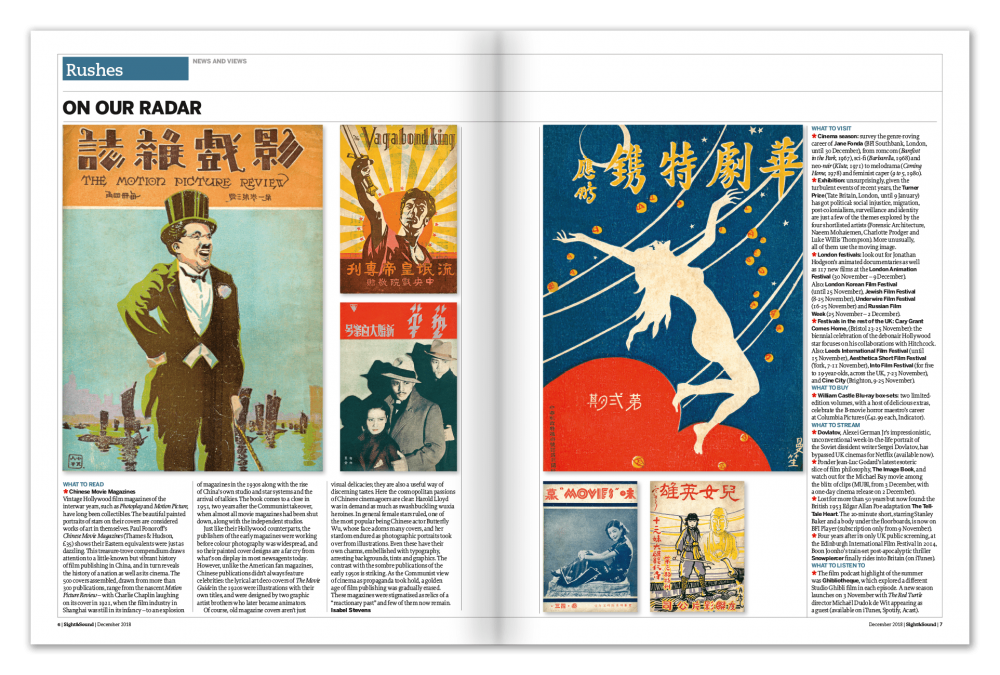
Our Rushes section
On our radar: what to read, visit, buy, streama and listen to
Chinese Movie Magazines, plus a Jane Fonda season, William Castle Blu-ray box-sets, Godard’s The Image Book, Ghibliotheque and more
Interview: Creative partners
Paul Dano and Zoe Kazan talk about collaborating in life and in film – and about their adaptation of Richard Ford’s novel Wildlife. By Sophie Monks Kaufman.
Dream palaces: Obala, Sarajevo
Our new monthly column on great cinemas around the world kicks off with an underground venue in Sarajevo during the Bosnian war. By Mark Cousins.
Industry: The numbers
With The Wife, Glenn Close finally seems to have found a film that draws audiences to match her acknowledged star quality. By Charles Gant.
In production: The singing directors
Newly announced films by Wes Anderson, Steven Spielberg, Guillermo del Toro, Luca Guadignino and Phyllis Nagy.
Wide angle
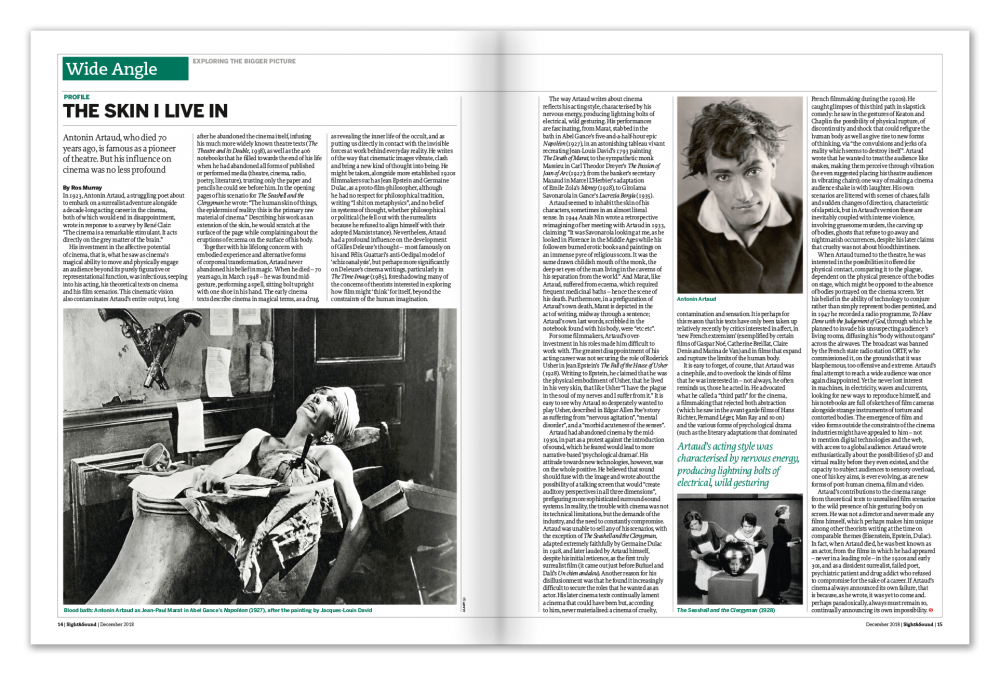
Our Wide Angle section
Rediscovery: Genius at work
At last Lorenza Mazzetti, one of the brains behind the Free Cinema movement in the 1950s, is getting the credit she’s due. By Pamela Hutchinson.
Profile: The skin I live in
Antonin Artaud, who died 70 years ago, is famous as a pioneer of theatre. But his influence on cinema was no less profound. By Ros Murray.
Primal screen: Looking at the stars
Frank Borzage understood the grim realities of life, but his romantic, idealistic films can still sweep modern audiences off their feet. By David Cairns.
Tribute: Top mark
For the late Mark Fisher, writing was a political project, an act of cultural galvanisation: reading his criticism is exhilarating. By Sukhdev Sandhu.
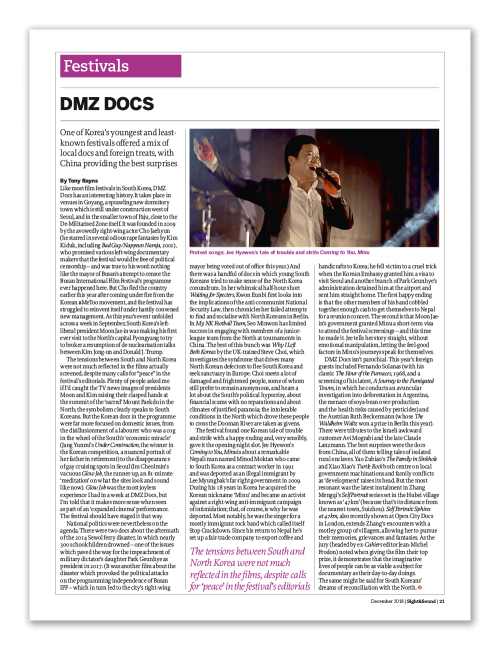
Our Festivals section
Festivals
DMZ Docs
One of Korea’s youngest and leastknown festivals offered a mix of local docs and foreign treats, with China providing the best surprises. By Tony Rayns.
Reviews
Films of the month
Happy New Year, Colin Burstead.
Shoplifters
Suspiria
plus reviews of
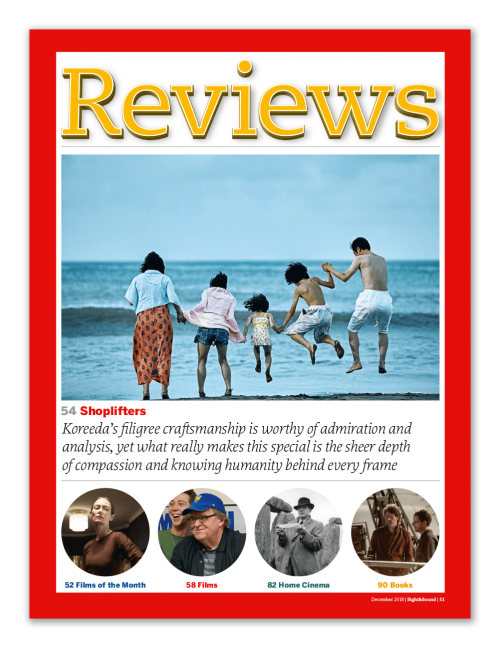
Our Reviews section
Anna and the Apocalypse
An Artist’s Eyes
Assassination Nation
Bad Times at the El Royale
Becoming Animal
Black Mother
Disobedience
Fahrenheit 11/9
The Guilty
Johnny English Strikes Again
Make Me Up
¡Nae pasarán!
Orione
The Other Side of Everything
Outlaw King
Overlord
Postcards from London
The Price of Everything
Siberia
Smallfoot
A Thousand Girls like Me
3 Days in Quiberon
Three Identical Strangers
Tides
22 July
Venom
Waru
Wildlife
The Wild Pear Tree
A Woman Captured
Won’t You Be My Neighbor?
The Workshop
Home Cinema features
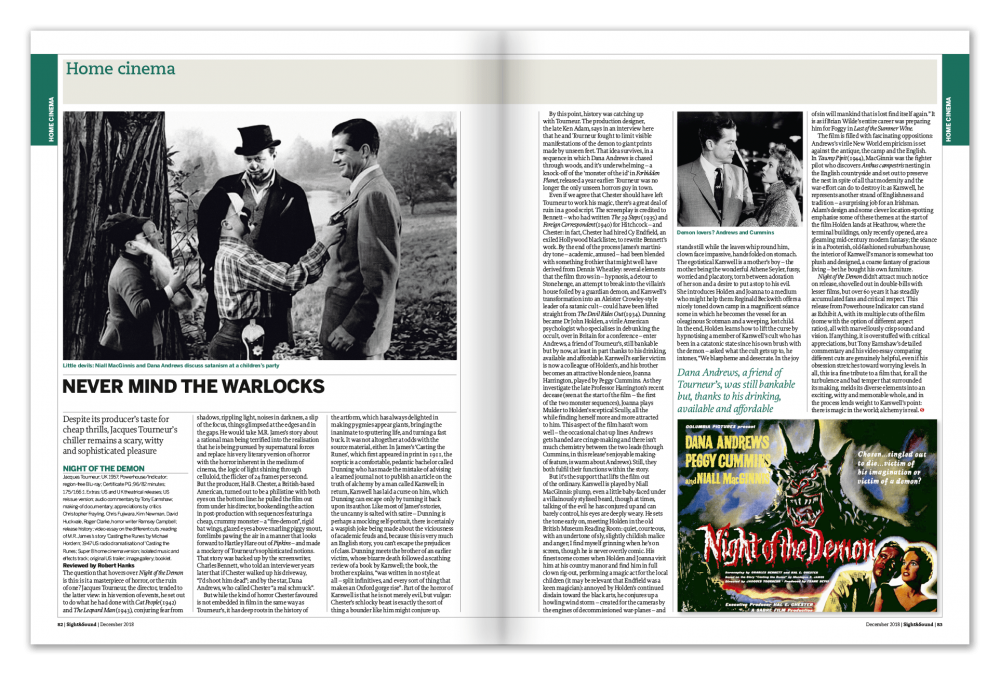
Our Home Cinema section
Never mind the warlocks: Night of the Demon
Despite its producer’s taste for cheap thrills, Jacques Tourneur’s chiller remains a scary, witty and sophisticated pleasure. Reviewed by Robert Hanks.
Rediscovery: Joaquim Pedro de Andrade: The Complete Films
(Garrincha, Joy of the People / The Priest and the Girl / Macunaima / The Conspirators / Conjugal Warfare / The Brazilwood Man)
A new box-set gives anglophone viewers a chance to appreciate the originality of a perpetually revolutionary Brazilian filmmaker. By Michael Atkinson.
Documentary: From Lift to The Road – The Films of Mark Isaacs
His compassion and sharp observational skills make Marc Isaacs one of the great British filmmakers of our time. Reviewed by Trevor Johnston.
Rediscovery: The Ballad of Gregorio Cortez
A real-life incident in 1901, and the decades of songs and stories it inspired, were the basis for an unusual western. Reviewed by Felix Bazalgette.
plus reviews of
Bloody Spear at Mount Fuji
The Comfort of Strangers
Death Laid An Egg
Eye of the Needle
The Man Who Cheated Himself
Ministry of Fear
The Miraculous Virgin
Missing
Salvador
Television
Robert Hanks investigates the greatness of The Rockford Files and Columbo.
Books
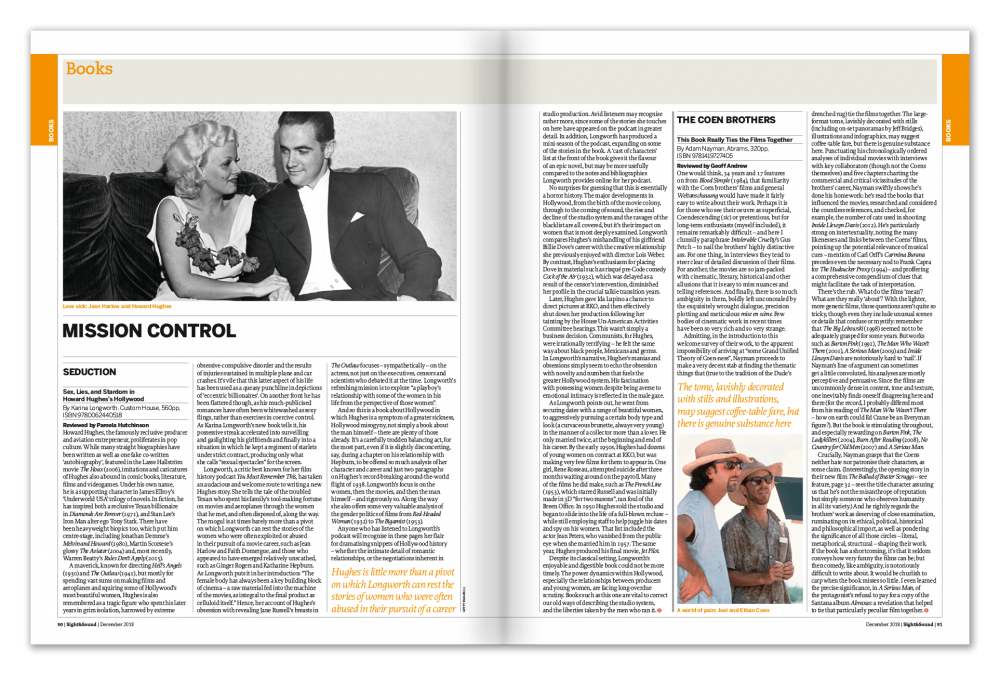
Our Books section
Seduction: Sex, Lies, and Stardom in Howard Hughes’s Hollywood by Karina Longworth (Custom House) reviewed by Pamela Hutchinson
The Coen Brothers: This Book Really Ties the Films Together by Adam Nayman, Abrams reviewed by Geoff Andrew
Robin Wood on the Horror Film edited by Barry Keith Grant (Wayne State University Press) reviewed by Brad Stevens
Mixing Work with Pleasure: My Life at Studio Ghibli by Suzuki Toshio, translated by Roger Speares (Japan Publishing Industry Foundation for Culture) reviewed by Alex Dudok de Wit
Letters
Stanley Kubrick vs Burt Reynolds
The squeeze on UK arts education
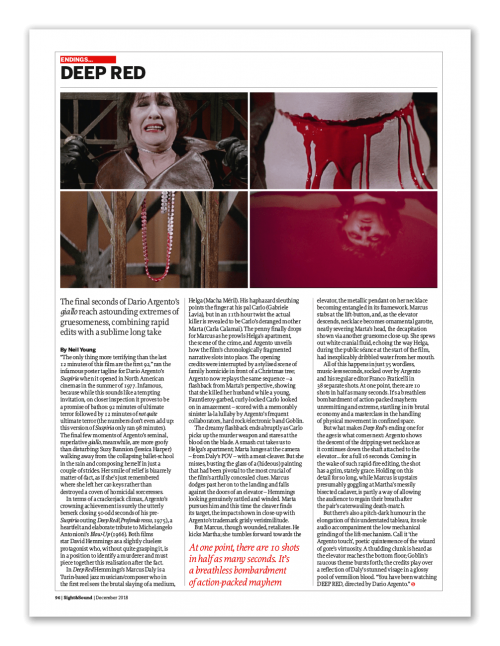
Australian female directorial firsts
Stanley Kramer’s blacklist defiance
Splendour with Zohra Lampert
James Mason vs Bradley Cooper’s falling stars
Endings
Deep Red
The final seconds of Dario Argento’s giallo reach astounding extremes of gruesomeness, combining rapid edits with a sublime long take. By Neil Young.
→ Buy a print edition
→ Access the digital edition
→




